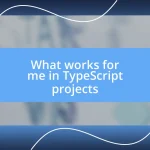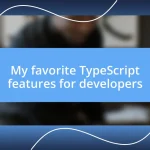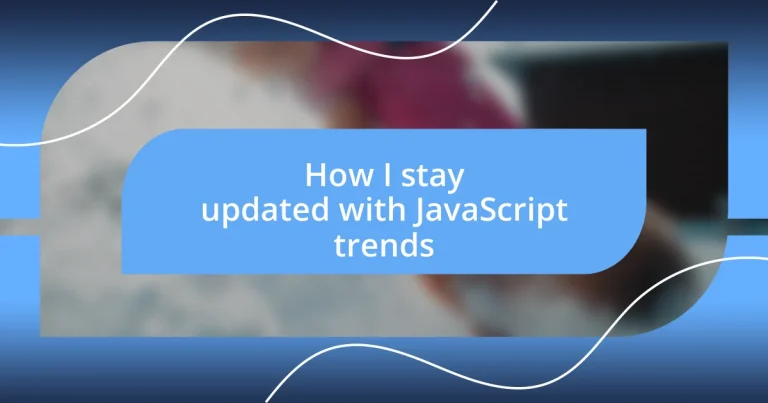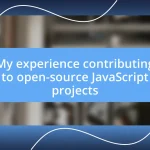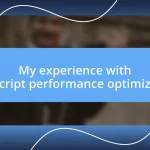Key takeaways:
- Staying engaged with the JavaScript community through meetups, conferences, and online forums enhances understanding and sparks innovation.
- Following influential blogs and subscribing to newsletters provide curated insights, keeping developers updated on trends and best practices.
- Utilizing online learning platforms and social media for real-time updates and discussions fosters a more dynamic and interactive learning experience.
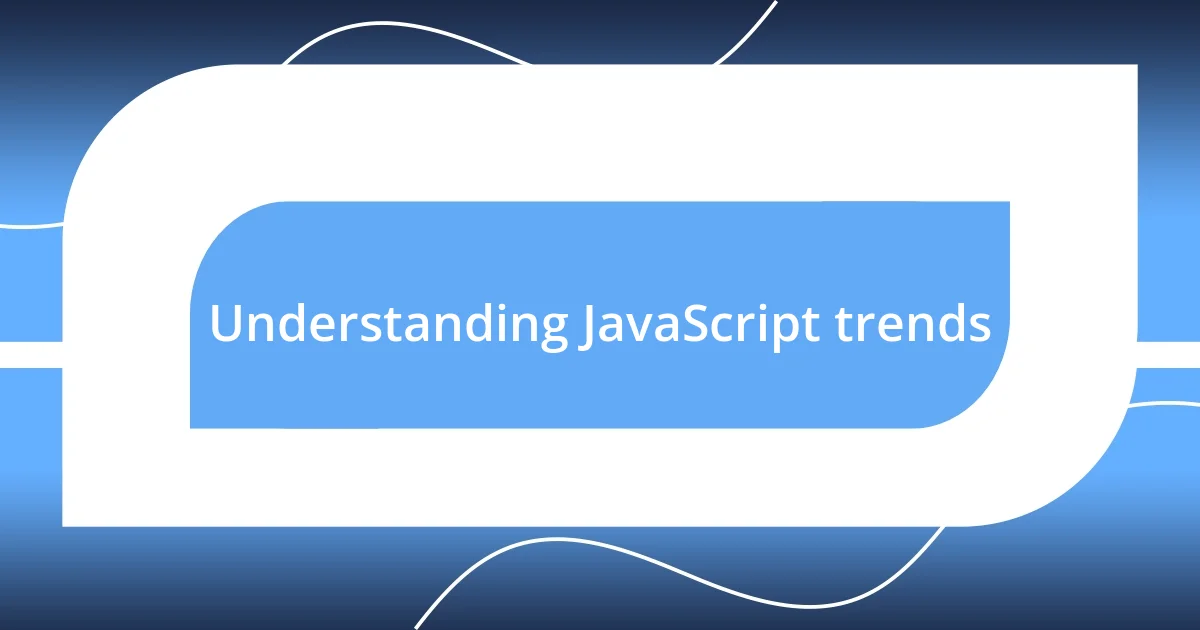
Understanding JavaScript trends
Understanding JavaScript trends requires a keen eye on the evolving landscape of web development. I remember the moment when I first realized how quickly the ecosystem shifts; it was during a local tech meet-up where a developer casually mentioned a framework that had gained traction overnight. That sparked my curiosity and showed me just how essential it is to stay engaged with the community.
As I dive deeper into JavaScript trends, I often ask myself: what makes certain frameworks or libraries gain popularity? Sometimes, it’s about solving real problems developers face. When I started using React, what struck me was its component-based architecture, which radically changed how I approached building user interfaces. This was a game-changer personally, and it exemplifies how trends reflect broader shifts in developer needs and preferences.
Engaging with JavaScript trends isn’t just about tools; it’s about understanding the culture and mindset behind them. I’ve found that participating in online communities and reading blogs helps me see patterns that might not be immediately obvious. Have you ever noticed how certain libraries just seem to resonate with people? It’s fascinating to explore why some ideas stick while others fade away, giving us a glimpse into the future of development.

Follow Influential JavaScript Blogs
Staying updated through influential JavaScript blogs is a strategy I rely on heavily. I recall stumbling upon a blog by Dan Abramov early in my journey. His insights on state management with Redux opened my eyes to how crucial understanding the underlying principles can be—not just for coding, but for grasping the entire ecosystem. It’s like having a seasoned mentor guiding you through complex topics while breaking them down into manageable bites.
When I read popular blogs, I often feel a sense of connection with the author. Their passion ignites my own. Articles that delve into recent trends provide clarity, especially when they explain how new libraries or frameworks evolve from existing technologies. I remember reading a piece that dissected the rise of Svelte, and it made me think not only about the technical aspects but also about the community’s response to its innovative approach. There’s always a crossover between technology and emotion in this field that I find compelling.
Moreover, I encourage you to periodically revisit your favorite blogs. Timely updates can make all the difference. I once noticed that following a particular blog inspired me to experiment more with code. Each post was like unlocking a new skill that invigorated my projects. Don’t underestimate how a well-written article can transform your perspective on JavaScript and encourage you to try something new—finding inspiration can be just a few clicks away.
| Blog Name | Focus Area |
|---|---|
| CSS-Tricks | Web design and development with a strong emphasis on JavaScript tips |
| Smashing Magazine | Comprehensive articles on web development, including JavaScript best practices |
| JavaScript Weekly | A newsletter of the latest JavaScript news and articles |
| Dev.to | A platform for developers to share thoughts, tips, and tutorials on various technologies including JavaScript |
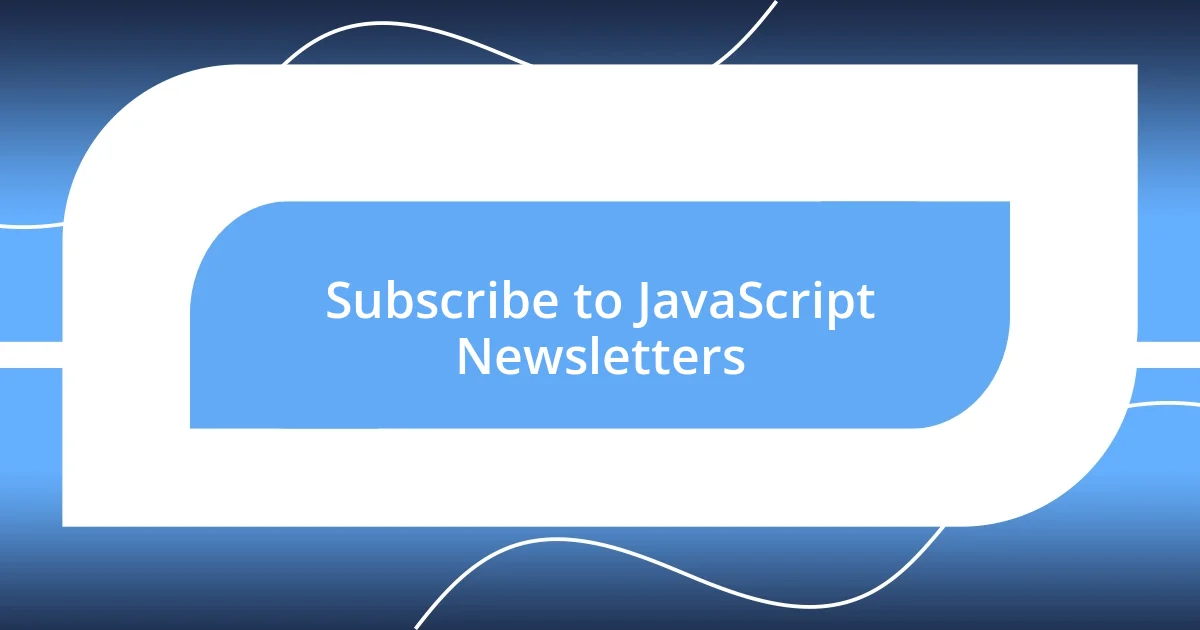
Subscribe to JavaScript Newsletters
Staying updated through JavaScript newsletters has become a cornerstone of my routine, and I’ve found some incredible resources that genuinely keep me in the loop. I remember the first time I subscribed to a dedicated JavaScript newsletter; it was like opening a window to a world full of fresh insights and trends I would have otherwise missed. Each newsletter feels like a curated selection of the best articles, tutorials, and news, making it easy to digest essential information without getting lost in the noise.
Here are a few newsletters I recommend that keep me engaged and informed:
- JavaScript Weekly: A reliable roundup of the latest articles and news in the JavaScript ecosystem.
- React Status: Focused specifically on React, this newsletter shares valuable insights, libraries, and components worth exploring.
- Front-End Focus: This highlights not just JavaScript but the broader front-end landscape, including tools, trends, and best practices.
- Node Weekly: Excellent for anyone working with Node.js, it gathers a wealth of resources related to server-side JavaScript.
The thrill of discovering a new technique or framework through these newsletters often motivates me to dive deeper into my own projects. There’s a unique excitement in seeing how ideas discussed in the latest issue can directly influence the way I handle my code. Each newsletter is like a friendly nudge reminding me to stay curious and proactive in this ever-evolving field.
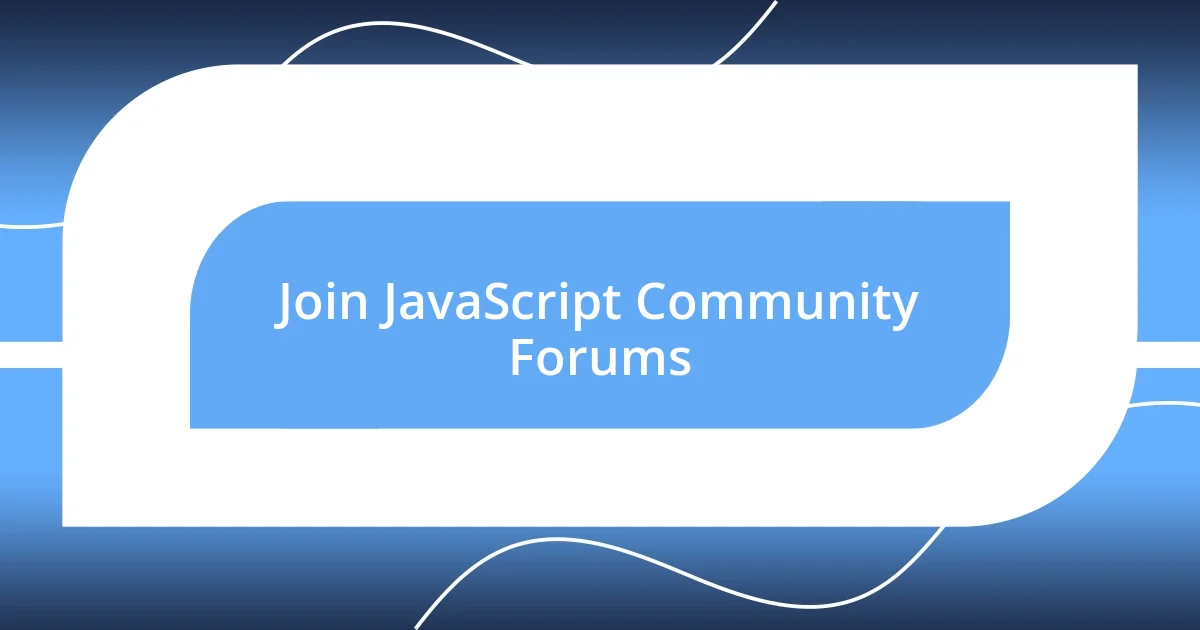
Join JavaScript Community Forums
Joining JavaScript community forums has been a game-changer for me. The moment I participated in my first discussion on Reddit’s r/javascript, I felt an immediate thrill. It was refreshing to engage with like-minded developers, share challenges, and celebrate breakthroughs together. Have you ever found yourself stuck on a problem, only to realize someone else has already figured it out? That sense of camaraderie is invaluable.
One of the aspects I love about these forums is the variety of perspectives they offer. I remember once posting a query about optimizing my React components, and what a flood of advice that brought in. Each response contributed a unique angle, enriching my understanding of an otherwise daunting topic. Isn’t it fascinating how collaboration can drive innovation? Engaging in these dialogues not only helps refine my technical skills but also inspires me to tackle projects I might have hesitated to approach alone.
Furthermore, I often scroll through older threads just to see how discussions have evolved. It’s amazing to witness the journey of JavaScript itself through the eyes of the community. Reflecting on past solutions and comparing them with current trends provides clarity on how fast-paced this field is—a reminder that we’re all in a continuous learning mode. Personally, I’ve found that immersing myself in this dynamic environment encourages curiosity and creativity like nothing else. What’s stopping you from diving into a forum today? You never know what you might learn!
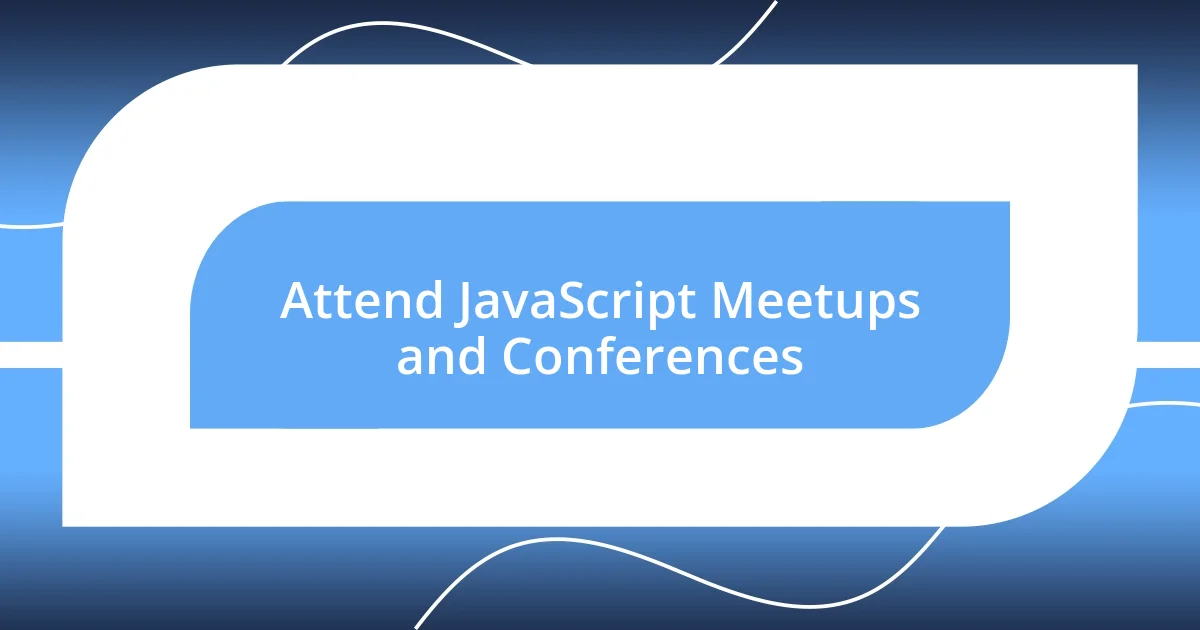
Attend JavaScript Meetups and Conferences
Attending JavaScript meetups and conferences has become one of my favorite ways to stay current with the latest trends. I still remember my first meetup; I walked in feeling a mix of excitement and nervousness, but within seconds, I was greeted with warm smiles and engaging conversations. That initial experience showed me just how invaluable face-to-face interactions can be in this digital age. Have you ever had your perspective radically shift simply from chatting with someone else? I can confidently say that those casual conversations often lead to some of my biggest “aha!” moments.
Conferences take that experience to another level, plunging you into a whirlwind of workshops, talks, and networking opportunities. One year, at a large JavaScript conference, I listened to a particularly passionate speaker discussing the future of asynchronous programming. I was completely captivated—as if a light bulb had gone off in my head. I still scribble notes from that session in my work journal to remind myself how deep diving into cutting-edge topics can transform my coding style. The energy in the air during such events is contagious; you can feel the collective drive of professionals eager to learn and share.
What truly stands out to me is the chance to connect with mentors and industry leaders who share their hard-earned wisdom. I once had a coffee break with a well-respected developer who had been in the game for decades. Just hearing their stories about overcoming challenges and embracing change was inspiring. It reinforced my belief that learning doesn’t just happen in isolation—it thrives in community. Isn’t it incredible how a simple conversation can ignite your passion and reshape your approach? So, if you have the chance, don’t hesitate to attend these gatherings; you never know what profound insights await!
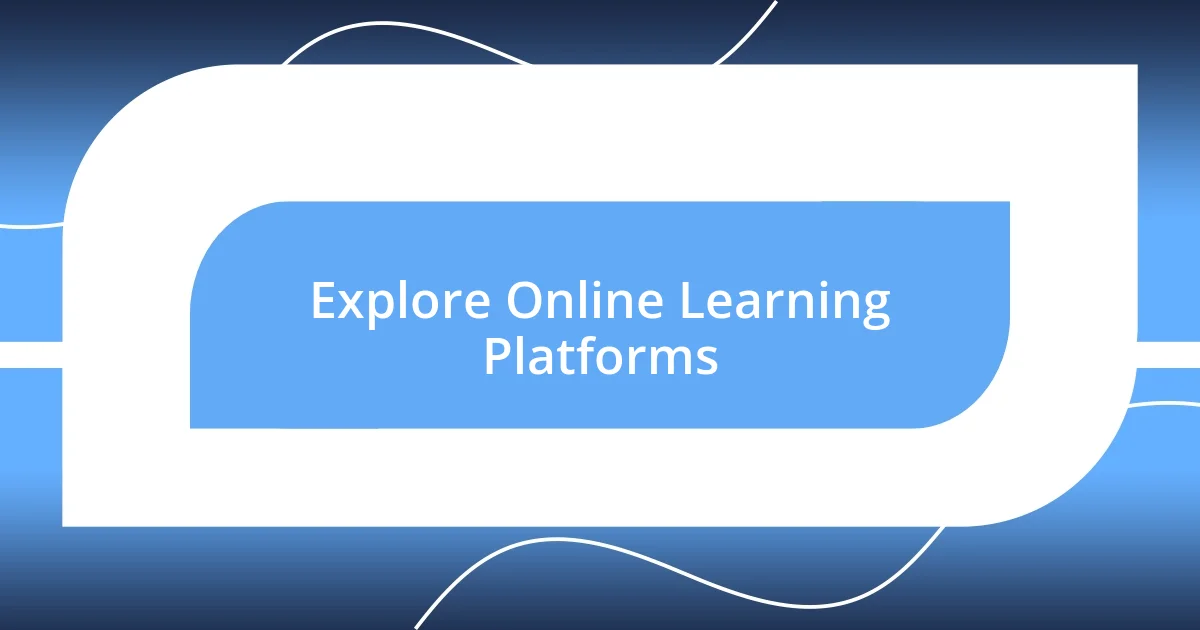
Explore Online Learning Platforms
Exploring online learning platforms has truly become an integral part of how I keep my JavaScript skills sharp. I remember stumbling upon a course on Udemy focused on modern JavaScript. As I watched the lectures, I felt a rush of excitement when I finally grasped concepts that had once puzzled me. Have you ever experienced that moment when everything just clicks? That sense of accomplishment was motivating and drove me to dive deeper into more advanced topics.
One of the things I appreciate most about platforms like Codecademy and Pluralsight is the hands-on approach they offer. I can recall sitting at my desk, fully immersed in a project, and suddenly hitting a wall. Instead of getting frustrated, I turned to a platform that allowed me to practice specific skills through interactive exercises. Being able to work in real-time, failing fast, and learning how to debug my mistakes was a game changer. It’s like having a personal coach guiding me through each stumbling block.
Another amazing resource is free video tutorials available on YouTube. There’s something empowering about watching a skilled coder solve problems right before my eyes. I often find myself pausing videos to replicate their steps on my own. It’s both exhilarating and nerve-wracking, isn’t it? That mixture of anticipation and discovery keeps me engaged and eager to learn more. Ultimately, these online platforms have transformed my learning experience into a more dynamic and interactive journey. What resources will you choose to fuel your own learning adventure?

Utilize Social Media for Updates
Utilizing social media for staying updated on JavaScript trends has been a game-changer for me. I recall scrolling through Twitter one evening and coming across a thread by a renowned developer who shared their latest project that creatively used React Hooks. That moment opened my eyes to innovative approaches I’d never considered before. Isn’t it amazing how a simple tweet can spark your imagination and broaden your perspective?
I find platforms like LinkedIn particularly valuable for professional insights. I once followed a group where industry leaders shared articles and engaged in discussions about JavaScript advancements. Each post felt like a mini-conference right in my feed. That online community vibe not only keeps me informed but also inspires me to contribute my thoughts. Have you ever felt compelled to join a conversation after reading someone else’s perspective? I certainly have, and those interactions often lead to meaningful connections.
Don’t underestimate the power of specialized Facebook groups or Reddit communities dedicated to JavaScript. I vividly remember a discussion on Reddit where someone posed a question about tackling server-side rendering with Next.js. The responses flooded in, ranging from basic tips to advanced techniques, and I found myself bookmarking several threads for future reference. Engaging in these communities not only enriches my understanding but also reminds me that learning is a shared journey. How about you—what social media channels do you use to boost your knowledge?
